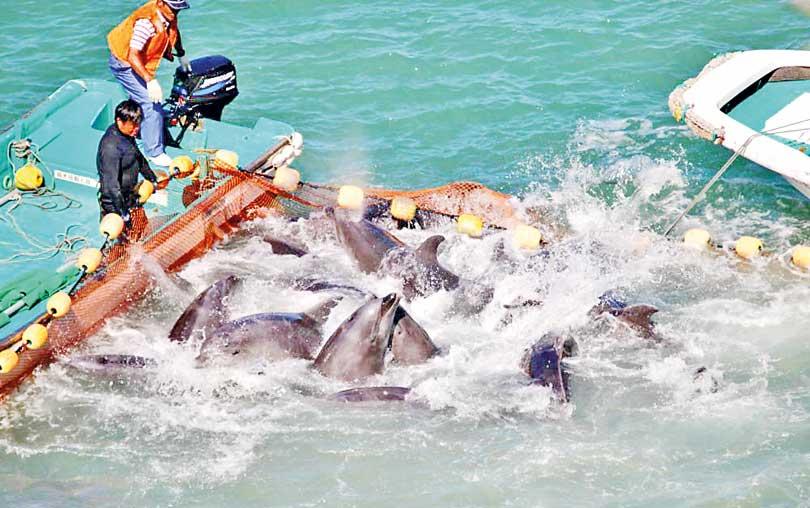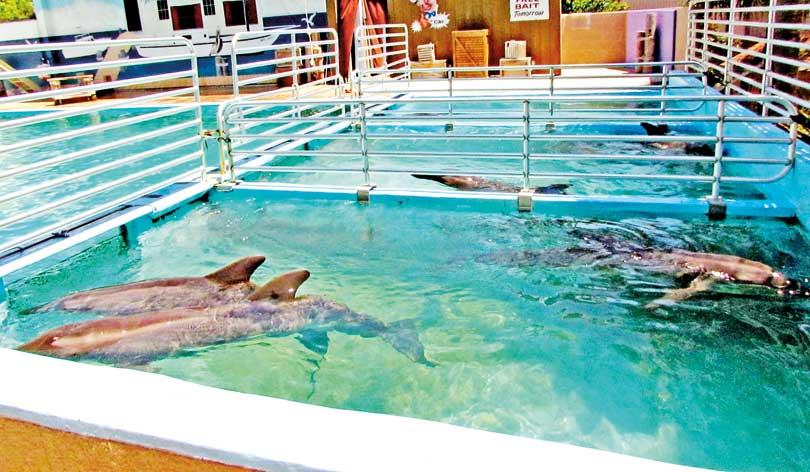Reply To:
Name - Reply Comment
 Cetaceans, the marine mammals that include dolphins, porpoises and whales are some of the most intelligent animals on the planet and like most wild animals, suffer immensely in captivity.
Cetaceans, the marine mammals that include dolphins, porpoises and whales are some of the most intelligent animals on the planet and like most wild animals, suffer immensely in captivity. The methods to bring wild dolphins to marine attractions that include theme parks like SeaWorld, swimming with dolphin experiences, and dolphinariums around the world is cruel, as anyone who has seen the Oscar-winning documentary ‘The Cove’ can attest to, as they witness pods of dolphins being cornered, split from their pods and driven into nets for capture.
While breeding dolphins and other cetaceans into captivity is often justified as “conservation” efforts, even those establishments with high animal welfare standards have cause for criticism. Ideally, cetaceans in captivity should only be those that are too sick or injured to survive in the wild.
TripAdvisor, the world’s largest travel review site, and associated company Viator echoed these sentiments in their media release on October 2: “Trip Advisor will no longer sell tickets to or generate revenue from, any attraction that continues to contribute to the captivity of future generations of cetaceans”
“As a result, any commercial facility that either breeds or imports cetaceans for public display will be banned from sale on TripAdvisor and Viator. Products currently on sale and found to breach the new rules will be removed over the next few months, with the policy in full force by the end of 2019. The new policy will not apply to seaside sanctuaries that provide care to cetaceans already in captivity”
“The decision follows an extensive consultation process with a range of experts, including marine biologists, zoologists and conservationists, and considered the scientific evidence and arguments presented from all sides. It continues TripAdvisor’s commitment to improving the welfare of animals globally, particularly animals in tourism.”

“The extensive evidence presented to us by the experts was compelling. Whales and dolphins do not thrive in limited captive environments, and we hope to see a future where they live as they should - free and in the wild,” commented Dermot Halpin, President, TripAdvisor Experiences and Rentals. “We believe the current generation of whales and dolphins in captivity should be the last, and we look forward to seeing this position adopted more widely throughout the travel industry.”
In 2003, India banned the keeping of dolphins for public entertainment and more recently, Canada passed legislation banning whales, dolphins and porpoises from being bred or held in captivity.
“TripAdvisor’s policy extension also takes into account that while it is possible to prevent future generations of cetaceans from a life of captivity, for those already in captivity, the situation is different. For most of the current population of cetaceans, release into the wild is not a realistic option. Therefore, the policy includes several stipulations aimed at protecting the needs, safety and health of cetaceans currently in captivity, too”
“Our aim is not only to prevent future generations of whales and dolphins from being raised in captivity but also to encourage the industry to move towards alternative models, like seaside sanctuaries, that will better provide for the needs of the current captive population,” added Dermot Halpin, President, TripAdvisor Experiences and Rentals. “Seaside sanctuaries have enormous potential, but they need more backing from the tourism industry. As long as facilities with captive whales and dolphins continue to profit from keeping these animals in smaller, cheaper and less natural living environments, then they don’t have enough incentive to adopt serious change. We hope our announcement today can help turn the tide.”
This announcement represents the latest extension of TripAdvisor’s industry-leading animal welfare policy, which was first launched in 2016. The policy already commits TripAdvisor and its subsidiary brand Viator to no longer sell tickets to experiences where travellers come into physical contact with captive wild animals, such as elephant rides and tiger petting experiences. It was further enhanced in 2018, at which point TripAdvisor also banned demeaning animal shows and performances from sale.

TripAdvisor joins a growing movement that has recognised the issues surrounding captive cetaceans. In 2003, India banned the keeping of dolphins for public entertainment and more recently, Canada passed legislation banning whales, dolphins and porpoises from being bred or held in captivity.
Animal welfare group Born Free estimates there are currently more than 2,000 dolphins, 200 beluga whales, 30 porpoises and 60 orcas (killer whales) held in captivity across the world, concentrated mostly in countries such China, Japan, the USA, Mexico and Russia.
Shorter lives – the death rate for captive orcas is 2.5 times higher than in the wild. Bottlenose dolphins and belugas also have higher death rates in captivity than in the wild.
Attacks – frustration can cause captive whales and dolphins to attack each other and sometimes trainers and members of the public.
Repetitive behaviours – in confinement, whales and dolphins may swim endlessly in circles, lie on the floor of the tank for many hours, chew on the sides of the pool and repeat the same patterns of behaviour over and over.
Dorsal fin collapse – orcas kept in tanks spend most of their time swimming in endless circles, causing their tall dorsal fins to collapse to one side. Dorsal fin collapse happens to 1% of wild orcas. 100% of captive male adult orcas have collapsed dorsal fins.
Drugs – some parks give captive whales and dolphins tranquillisers to relieve the stress that they are feeling.